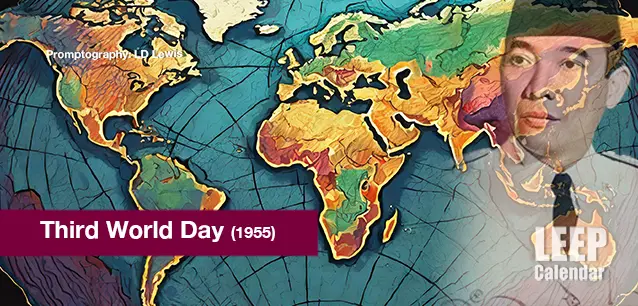 AD
AD
Today is: January 11
Scroll to explore events active on this date.
LEEP INK FEATURES

August? Absolutely!
In August, we live through the Dog Days of Summer. It's hot and often humid, and those who can leave for better climates do. Down south, winter is in full force. August is also known as "the ...

In The Heat of July: July 2025 Events
Is it hot enough (or cold enough if you're below the equator) for you yet? There is actually a day for that! Like every month, I pick a diverse collection of events you may or may not know about. This ...

May Blooms: Events in May 2025
Along with October, May is one of the most densely packed months of the year. It's before the summer humidity and the last whole month of the school year. The weather is warming in t...
About Third World Day
Finance & Banking , Civil Rights
Ends: Apr 18, 2024
DESCRIPTION:
ABOUT THIRD WORLD DAY
On April 18, 1955, Indonesian President Sukarno coined the phrase "Third World" to describe less developed nations not attached to the Soviet block or NATO. THIRD WORLD, GLOBAL SOUTH, DEVELOPING WORLD—What's the difference?
The terms "Third World," "Global South," and "Developing World" are often used to describe various groups of countries based on their economic development, political systems, and historical context. While people sometimes use the words interchangeably in casual conversation, each term has its own distinct origin and connotations.
THIRD WORLD
The term "Third World" originated during the Cold War to describe countries that were neither aligned with NATO and the capitalist West (the First World) nor with the Communist Bloc led by the Soviet Union (the Second World). It included many countries in Africa, Latin America, Asia, and Oceania that were not actively participating in the Cold War's ideological and political divisions.
Over time, the term came to be associated with countries characterized by lower economic development, higher rates of poverty, and weaker political institutions. However, the use of "Third World" has declined due to its Cold War origins and its negative, simplistic connotations, implying a hierarchical ordering with these countries being the lowest.
Using the term "Third World" is now considered disrespectful and, by many, racist.
GLOBAL SOUTH
"Global South" is a more contemporary term that refers to countries located primarily in the southern hemisphere, historically less economically developed than those in the northern hemisphere. It highlights the socio-economic and political divide between these nations and the wealthier, more developed "Global North." Unlike "Third World," "Global South" attempts to avoid the hierarchical implications and instead emphasizes geographical and historical factors contributing to global inequality. It's important to note, though, that "Global South" is not strictly a geographical term, as it includes countries in the northern hemisphere that face similar developmental and economic challenges as those typically found in the southern hemisphere.
DEVELOPING WORLD
"Developing World" is a term used to describe countries with lower levels of industrialization, lower Human Development Index (HDI) scores, and, generally, lower gross national income per capita than more developed countries. International organizations such as the United Nations often use this term to group countries that share similar economic and developmental characteristics, focusing on the economic aspects rather than political alignments or geographical location. While "developing world" is widely used, it has faced criticism for potentially perpetuating stereotypes about poverty and underdevelopment and for its broad generalization that doesn't capture the diversity and complexity of conditions within these countries.
CONCLUSION
While all three terms attempt to group countries with similar developmental profiles, each reflects different perspectives on global inequality and development. The choice between them often depends on the context in which they are used, with a trend toward more inclusive and less hierarchical language.
VIDEOS
Currently, this event does not have supporting videos.
SUPPORTING DOCUMENTS
Currently, this event does not have supporting documents.
ADDITIONAL IMAGES
Currently, this event does not have supporting images.
Where would you like to go now?
 AD
AD


/footer-logo.svg)
